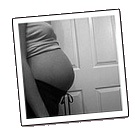 Placental abruption is when the placenta separates from the site which it is implanted in the uterus.
If the placenta begins to detach during the course of your pregnancy there will be some bleeding as the blood vessels which attach to your placenta will begin to detach. The larger the area which detaches, the greater the amount of bleeding.
Placental abruption is when the placenta separates from the site which it is implanted in the uterus.
If the placenta begins to detach during the course of your pregnancy there will be some bleeding as the blood vessels which attach to your placenta will begin to detach. The larger the area which detaches, the greater the amount of bleeding.
What may cause placenta abruption?
- Previous pregnancies with placenta abruption
- Hypertension (high blood pressure)
- Cigarette smoking
- Multiple/Twin pregnancy
Is placenta abruption dangerous?
Placenta abruption is dangerous mainly because of the risk of uncontrolled bleeding or haemorrhaging which may occur as a result. It may also lead to other possible complications, such as:- Haemorrhage and shock
- Disseminated vascular coagulation (DIC) – a serious blood clotting complication
- Poor blood flow and damage to kidneys or brain
- Stillbirth
- Postpartum haemorrhage
What are the symptoms of placenta abruption?
- Vaginal bleeding
- Abdominal pain
- Uterine contractions that do not relax
- Blood in amniotic fluid
- Nausea
- Thirst
- Feeling faint
- Decreased fetal movements
How is placenta abruption treated?
Treatment for placenta abruption will be determined by your healthcare provider based on:- Your pregnancy, overall health, medical history
- Extent of the complication
- Tolerance for specific medications, procedures, or therapies
- Your opinion or preference
Placenta Abruption



